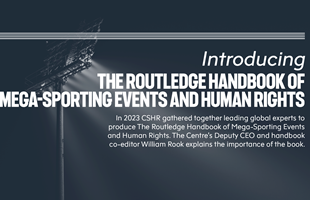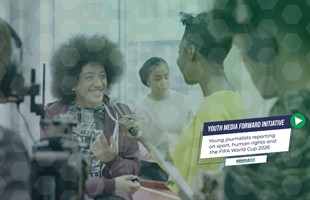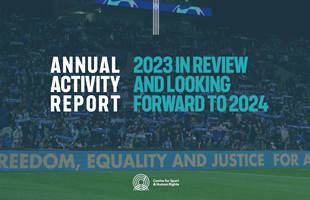New Hosts, New Risks. Lessons from the Proposed Expansion of the 2022 FIFA World Cup

Until two weeks ago, expansion of the 2022 FIFA World Cup to 48 teams was considered a real possibility. Preliminary negotiations involving possible co-hosts were underway, and a feasibility study setting out a range of considerations, including with respect to human rights had been undertaken. With just over three years until kick off, any expansion would have required a co-host, in addition to Qatar, to accommodate the increased level of organising capacity required.
Expectations that expansion would be on the agenda for FIFA’s Council and Congress meetings in Paris this week seemed clear cut, until it was announced that plans for an enlarged competition had been dropped. For the human rights community, this is a significant decision.
The Road to 2022
The awarding of the 2022 World Cup to Qatar in 2010 was controversial from a human rights perspective. Recent disclosures remind us of the high-risk nature of hosting the tournament in the country and continue to raise serious concerns. There has, however, been significant and incremental progress implemented by the Supreme Committee responsible for organising the World Cup on a number of key issues. These include joint health and safety inspections with the global trade union BWI, improvements in working and living conditions scrutinised by external audits, and an effort to ensure workers on World Cup projects are reimbursed recruitment costs. While much work remains to be done, there is already a clear human rights legacy emerging from the World Cup in Qatar.
These developments should be viewed in the context of the timeframe within which policies and systems for delivering the World Cup have been developed. It has been nine years since Qatar won the bid, nearly triple the timeframe that was under consideration for the 48 team expansion. Expansion would have raised real doubts that any potential co-host in the region could have established equivalent worker welfare measures between now and 2022.
Beyond the World Cup, there have been well-noted commitments to advance labour rights in Qatar over recent years that have differentiated the country within the region. It is difficult to determine how much of this change can be ascribed to the hosting of the World Cup or efforts by FIFA, versus a broad range of other factors. For example, our colleagues at the Institute for Human Rights and Business have been working on labour rights projects in Qatar for the past four years, along with many other organisations. They know important state-level developments in Qatar, such as the government’s partnership with the ILO, occurred in the wake of the country being blockaded by its neighbours in 2017, and have been premised on local stakeholders taking the lead.
After a Big Step Forward, Very Close to Two Steps Back
Over the past three years, FIFA's approach to institutionalising its commitment to human rights has been a welcome development and a demonstration of leadership within the world of sport. In particular, incorporating human rights criteria into the bidding process for the 2026 World Cup was a critical milestone that will provide opportunities to advance respect for human rights in North America in the lead up to the event and afterwards. This progress, much of it premised on the 2016 report by John Ruggie (former UN Special Representative on Business and Human Rights), would have been imperiled if expansion proposals had moved ahead.
Adding an additional host country for 2022 in such a compressed timeframe would have dramatically increased the level of human rights risks associated with hosting the competition, further exacerbated by the prospective co-hosts’ own elevated human rights risk profiles. This presented a cause for significant concern for human rights groups, especially regarding the prospect of games being hosted in Saudi Arabia. Extending the tournament in a high-risk region, with an ad hoc process, in a compressed timeframe, would almost certainly have caused increased harm to the athletes, fans, volunteers and officials, communities, journalists, workers and others at the heart of this mega-sporting event.
The Timing of Leverage
The human rights risks of expansion were an explicit part of FIFA's feasibility considerations. This included FIFA holding bilateral consultations with a variety of human rights stakeholders, including ourselves at the Centre for Sport and Human Rights. However, FIFA’s efforts to effectively implement their human rights due diligence processes would inevitably be limited if the prospective host countries under consideration were not themselves required to undertake an independent human rights risk assessment and explain how they would respond to risks identified.
This is exemplified by the 2026 World Cup bidding process, where it was made very clear during the bidding process that prospective hosts must undertake their own human rights due diligence and make explicit commitments to respect international human rights standards. The prospect of hosting rights being awarded in a context where prospective hosts were not required to consult stakeholders or potentially affected groups would have undermined a critical component of ensuring a meaningful process. In this case, retro-fitting these processes after the fact would not have adequately eliminated or mitigated the possible risks.
In fact, for FIFA’s extensive human rights criteria to have maximum impact, they should be addressed by prospective bidders at FIFA’s greatest point of leverage - before hosting rights are awarded. The abbreviated expansion process proposed for 2022 would have undercut the potential for prospective hosts to demonstrate:
- an understanding of their own human rights risks;
- what steps they themselves were prepared to undertake to address these risks; and,
- how human rights stakeholders are consulted and involved in the process.
These elements are fundamental to FIFA’s human rights requirements introduced with the 2026 bidding process. It is, therefore, a relief that the proposal to expand to 48 teams has gone no further. This moment provides an important opportunity to reflect on how sports bodies can best use their leverage to drive human rights through bidding processes.
To the extent that human rights implications played a role in the ultimate decision not to expand, the right outcome was reached.



